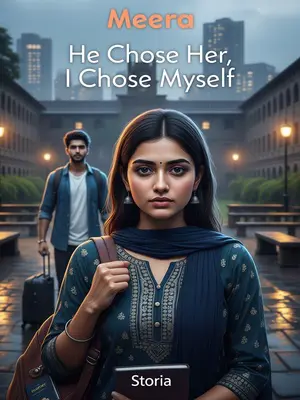Chapter 2: First Love, First Loss
Rohan and I met in our first year of college.
That first day, when the campus was a swirl of fresh faces and the smell of wet earth from the last rain, I barely knew where the canteen was. The crowd at the gate felt like a mela—parents, autos, and the constant calls of “Arrey beta, idhar aao!”
I had just arrived in this unfamiliar city when an elderly couple at the college gate asked to borrow money for bus fare. When I refused, they chased after me, cursing as they went:
“So young, yet not a shred of kindness.”
“Heartless girl! No man will want you in the future.”
My cheeks flushed, and my hands trembled with anger. I gripped my dupatta tightly, trying to hide how much their words stung.
Their words stung like mirchi powder. For a second, I wondered if anyone had heard. My heart thumped loudly, the same way it used to during exam results.
That’s when Rohan appeared.
A group of lively boys strolled by, shielding me behind them. Rohan stood out—tall and confident, holding an SG cricket bat, limited-edition sneakers on his feet. He flashed a row of white teeth at me.
His presence felt like the first cool breeze after a stifling day—easy, confident, and strangely reassuring. The way he twirled his bat, as if the world was a cricket pitch and he was already the star batsman, made the rest of the group fade into the background.
“Hey, fresher, are you alright?” he asked.
His voice had a teasing lilt, but his eyes were kind. I managed a small nod, still embarrassed. He grinned wider, as if we’d shared some secret.
He soon realised I was actually his peer, not a junior, but that didn’t stop him from chasing after me. And so, we got together.
He wasn’t the sort to let embarrassment slow him down—one day, he sent me a Friend Request with a cheeky message: “Let’s form a North-South alliance and rule the canteen menu!” We laughed over endless chai and samosas, and by the end of that semester, my phone was full of his silly voice notes.
He came from a well-off local family in Pune. I was from a small town in Uttar Pradesh.
His accent was pure Deccan, while I still said “chawal” the way my dadi did. Our backgrounds were as different as idli and litti-chokha. But for a while, it didn’t matter.
In our second year, he took me home to meet his parents. I nervously followed him, clutching a box of sweets. Unexpectedly, his mother was warm and welcoming. I breathed a sigh of relief.
His house smelled of sandalwood and fresh filter coffee. A brass lamp flickered in the corner, and old film songs played softly from the kitchen. His mother, draped in a crisp Paithani saree, took the sweets and smiled, “Asha, dekho beta kaun aaya hai!” I offered the mithai with both hands, and she patted my head, asking about my train journey.
Rohan winked at me, “See? I told you my mom would like you.”
He gave me that look—like he’d just scored the winning run. I grinned back, nerves melting away. For a second, I let myself imagine what it would be like to belong here.
I couldn’t help but feel happy.
In that moment, I forgot about all the cautions my Mausi had whispered on the phone: “Be careful, beta, ladke waale acche dikhte hain par…” All I saw was a possible future, with him at my side.
Back then, I didn’t realise his mother’s friendliness was just because he was her son—a boy. For her, it was just dating; for Rohan, he wouldn’t lose out either way.
I mistook courtesy for acceptance, and warmth for real welcome. Later, I’d understand that for many families, as long as the boy is happy, everything else can be sorted… until shaadi ki baat comes up.
So, we dated from first year to final year.
Our relationship became routine—morning walks in the college grounds, splitting maggi in the canteen, holding hands during movie nights at the local PVR, and fighting over which song to play on the bus ride home.



